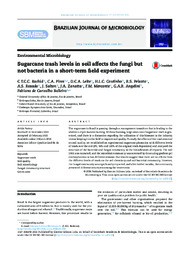Sugarcane trash levels in soil affects the fungi but not bacteria in a short-term field experiment.
Sugarcane trash levels in soil affects the fungi but not bacteria in a short-term field experiment.
Autoria: RACHID, C. T. C. C.; PIRES, C. A.; LEITE, D. C. A.; COUTINHO, H. L. C.; PEIXOTO, R. S.; ROSADO, A. S.; SALTON, J.; ZANATTA, J. A.; MERCANTE, F. M.; ANGELINI, G. A. R.; BALIEIRO, F. de C.
Resumo: The sugarcane in Brazil is passing through a management transition that is leading to the abolition of pre-harvest burning. Without burning, large amounts of sugarcane trash is generated, and there is a discussion regarding the utilization of this biomass in the industry versus keeping it in the field to improve soil quality. To study the effects of the trash removal on soil quality, we established an experimental sugarcane plantation with different levels of trash over the soil (0%, 50% and 100% of the original trash deposition) and analyzed the structure of the bacterial and fungal community as the bioindicators of impacts. The soil DNA was extracted, and the microbial community was screened by denaturing gradient gel electrophoresis in two different seasons. Our results suggest that there are no effects from the different levels of trash on the soil chemistry and soil bacterial community. However, the fungal community was significantly impacted, and after twelve months, the community presented different structures among the treatments.
Ano de publicação: 2016
Tipo de publicação: Artigo de periódico
Unidade: Embrapa Solos
Observações
1 - Por padrão são exibidas publicações dos últimos 20 anos. Para encontrar publicações mais antigas, configure o filtro ano de publicação, colocando o ano a partir do qual você deseja encontrar publicações. O filtro está na coluna da esquerda na busca acima.
2 - Para ler algumas publicações da Embrapa (apenas as que estão em formato ePub), é necessário ter, no celular ou computador, um desses softwares gratuitos. Sistemas Android: Google Play Livros; IOS: iBooks; Windows e Linux: software Calibre.
Acesse outras publicações
Acesse a Base de Dados da Pesquisa Agropecuária (BDPA) para consultar o acervo completo das bibliotecas da Embrapa.

